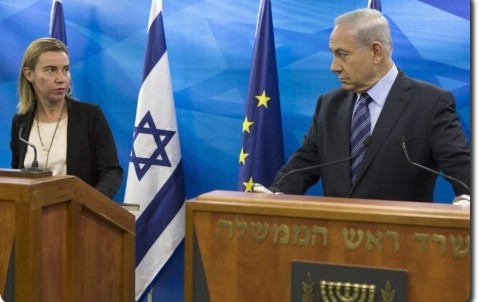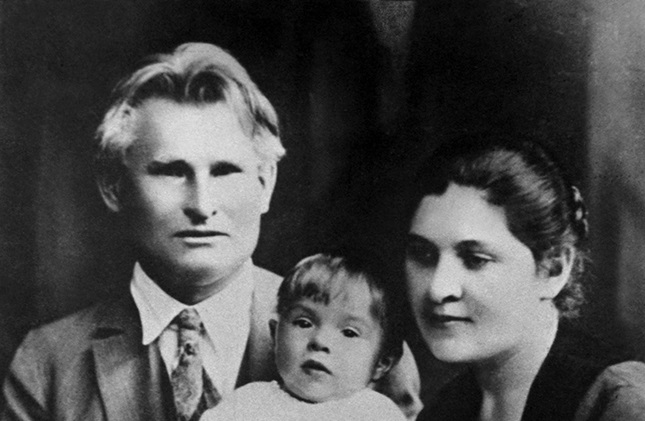With sadness we report the death of Lithuanian Jewish Community member Faina Duškina (July 28,1946–January 18, 2016) on January 18.
The LJC express our deepest regrets to her daughters for the loss of their mother.
With sadness we report the death of Lithuanian Jewish Community member Faina Duškina (July 28,1946–January 18, 2016) on January 18.
The LJC express our deepest regrets to her daughters for the loss of their mother.

Foreign ministers from the EU states Monday agreed on a statement on the derailed Middle East peace process and Jewish settlements in the occupied territories. Disagreements over the text were hammered out with some member-states calling the original statement too critical of Israel. “We unanimously adopted [the statement], that’s a good and common basis for our shared position and our engagement in the region,” EU foreign policy chief Federica Mogherini commented after the meeting in Brussels. The Palestinian and Israeli authorities both expressed reserved satisfaction with this diplomatic development by the EU. The text adopted expresses the EU’s deep concern over continuing violence and calls upon both parties in the conflict to take responsibility for their actions. The document expresses the EU’s confidence violence can be avoided through renewed dialogue.

The Islamic State is a terrorist state with almost all governing elements. Over the last four years, it has developed from an extremist fringe and marginal faction to become the strongest, most ferocious, best-funded and -armed militia in the religious and ethnic war which is being waged today in Syria and Iraq.
ISIS rules today over a swath of land bigger than the United Kingdom with a population of almost 10 million. ISIS changed its name to the Islamic State to illustrate that its goals are not limited to Iraq and the countries of the Fertile Crescent.
Since the fall of Muslim empires and supremacy, Muslim scholars and philosophers have tried to understand the reasons behind its collapse. The conclusion of most was that Muslim civilization had drifted away from the teachings of the Koran and adopted foreign and heretical inputs which destroyed its fabric. The remedy they proposed was to return to “pure Islam” and reconstruct Muslim society.
Full article here.
![]()
![]()
More than 7,900 French Jews made aliya in 2015, up 10% from the previous year, when the western European nation became the leading source of immigrants here with 7,000 olim.
More than 40 percent of French Jews are interested in making aliya to Israel, according to a new poll released this week. Pollsters at the Institut français d’opinion publique spoke with more than 700 self-declared Jews, asking them about their preferences regarding a range of issues. Among the findings: 43% are thinking, or have thought about, immigration to the Jewish state. Given France’s approximately 700,000 Jews, that means that around 200,000 people are mulling aliya.
Full story here.

Hamburg Jewish community representative Daniel Killy says it’s not safe for Jews in Germany and they feel in peril now. There have been more and more expressions of anti-Semitism in the country.
“No, it’s not safe for us here anymore,” Killy told reporters in Hamburg Tuesday. “There is a feeling of the disintegration of government in the German state, right-wing extremism is increasing, the government has lost confidence. People are afraid of Islamization. This entire recent situation has contributed to the insecurity of Jews.” The Hamburg Jewish community consists of about 2,500 people.
Germany has taken in more than one million refugees from Muslim countries. Jewish leaders there have warned of growing anti-Semitism as a result of the influx of people from countries where hatred of Jews and Israel is the status quo. In a comprehensive article on taggeschau.de Patrick Gensing, an expert on extremist ideologies, wrote anti-Semitic sentiments take on a variety of forms in Germany. The author based his piece on surveys conducted on “historical defensive Holocaust guilt” and discussed fanatical criticism of Israel, National Socialist racism and Muslim and Christian anti-Semitism.
The Vilna Gaon Jewish State Museum Wednesday kicked off a three-day seminar with speakers from around the world for sharing ideas with Lithuanian teachers teaching the Holocaust.
Museum director Markas Zingeris welcomed the audience and said the Holocaust has become topical in the news media again because of a convergence of events: Islamic fascists carrying out acts of terror on European streets and the response by right-wing extremists to the influx of refugees and others from Middle Eastern countries.
Danius Junevičius, roving ambassador-at-large from the Lithuanian Ministry of Foreign Affairs, said the history of Lithuanian Jews is inseparable from general Lithuanian history, and the lessons of the Holocaust are needed now more than ever, and that history must not repeat itself.
To mark International Holocaust Remembrance Day on January 27, the Vilna Gaon Jewish State Museum is hosting three days of seminars on the Holocaust featuring a panel of speakers from Lithuania and Western Europe. Speakers are to include Philippe Boukara and Georges Bensoussan from Mémorial de la Shoah, the French co-sponsor of the event with the International Commission for the Assessment of the Crimes of the Nazi and Soviet Occupational Regimes in Lithuania from Lithuania.
The seminars are called “The Holocaust, Collaboration and Mass Murder in Lithuania” and will run from January 20 to January 22.
On November 1, 2005, the General Assembly of the United Nations Organization adopted a resolution to mark International Holocaust Remembrance Day on January 27. Remembering the Holocaust is inseparable from studying the causes of this tragedy which rocked civilization to its core and inseparable from teaching and inculcating tolerance and human respect. Lithuania is a member of the International Holocaust Remembrance Alliance and an active participant in international programs to fight anti-Semitism.
The mass murder of Jews began even before the Nazis occupied Lithuania in 1941. Over a few months the majority of the Lithuanian Jewish community were murdered. Survivors were sent as slave labor to the ghettos set up in the cities and towns. The Nazis “liquidated” most of the ghettos after a few short months while the remaining ghettos in Vilnius, Kaunas and Šiauliai operated for another two to three years. The Vilnius ghetto was liquidated on September 23, 1943. Most of the inhabitants were shot to death at Ponar while others were transferred to concentration camps. The Panevėžys ghetto was liquidated on August 15, 1941. Thirteen and a half thousand Jews were shot. More than 200,000 Jews were murdered in Lithuania during World War II, accounting for approximately 95 percent of the Lithuanian Jewish community. There are more than 200 mass murder sites in Lithuania and about the same number of old Jewish cemeteries.
The Jewish community in Lithuania formed near the end of the 14th century. They were a thriving ethnic community in Lithuanian towns and cities by the beginning of the 20th century. In the period between the last half of the 19th and early 20th century, Jews accounted for between a quarter and a half of the population in many cities and towns. They were citizens of Lithuania with their own individual daily cares, worries and joys. Compared to other ethnic communities, the Jewish community was one of the largest in Lithuania.
Israeli prime minister Benjamin Netanyahu reacted with anger over the US ambassador’s criticism of Israeli policy vis-à-vis the Palestinians, coming at the height of a Palestinian terror campaign.
The US ambassador to Israel criticized Israeli policy in Judea and Samaria at a high-profile security conference Monday, a rare public rebuke which drew an angry response from prime minister Benjamin Netanyahu.
Ambassador Dan Shapiro said Washington was “concerned and perplexed” over Israel’s strategy of building West Bank settlements. Speaking to the annual conference of the Institute for National Security Studies, a top Israeli think-tank, he claimed Israel’s “continued expansion of settlements” raises questions about Israel’s intentions and its stated commitment to establishing an independent Palestinian state. Shapiro added Israel had also legalized some outposts despite pledges to the United States not to do so.
BERLIN–The Süddeutsche Zeitung newspaper falsely claimed tens of thousands of Israelis had fled to Germany because of the policies of the Netanyahu administration, the German Press Council has determined.
The council’s 5-to-1 vote to uphold their initial ruling against the largest broadsheet newspaper in Germany is the latest act in a long-running media dispute playing out with high-powered lawyers and media experts.
The case began in 2014 and the decision was made public in the first week of January. It was obtained by the Jerusalem Post late last week.
BRUSSELS (EJP)—EU aid to the Palestinian Authority (PA) should be linked to the clear pre-condition of an actual Palestinian renouncement of hate and all kinds of violence, member of European Parliament Lars Adaktusson (EPP, Christian Democrat) said while addressing a multi-party Middle East Peace Process Conference he hosted with the Brussels-based Israel advocacy group EIPA (Europe Israel Public Affairs) last week.
Adaktusson’s comments came as serious strains were showing in the EU-Israel relationship due to the EU’s decision last November to issue guidelines for the labeling of Israeli products from beyond the 1967 Green Line.
After an intense, week-long search, security forces eliminated the terrorist who opened fire at innocent civilians in Tel Aviv.
An Arab-Israeli terrorist who killed three people in Tel Aviv on New Year’s Day was slain Friday in a shootout with security forces, following a massive manhunt.
The terrorist, Nashat Milhem, opened fire at a bar on a busy Tel Aviv street on January 1, killing two people and wounding six.
Full story here.
Israel has been hit by more terrorist attacks. In the West Bank a 38-year-old nurse was killed by a Palestinian terrorist on Sunday and a pregnant woman was stabbed Monday morning.
A terrorist stabbed Dafna Meir to death in front of her teenage daughter inside their home in the West Bank settlement of Otniel near Hebron on Sunday evening. Meir attempted to fight off the attacker and suffered multiple stab wounds, including to her head.
The attacker fled the scene and remained at large Monday. The Israeli Army was pursuing him, an IDF spokesman said.
The attack marked the first time Palestinian terrorists were able to carry out a fatal attack inside a settlement since March of 2011, when five members of the Fogel family were stabbed to death in their home in Itamar.
Full story here.

A student who posted rabidly anti-Semitic remarks on facebook became the first to be expelled from the prestigious Science Po institute in Paris since the institution was founded in 1872, the UK’s Jewish Chronicle reported on Friday.
During an online debate with an Israeli student, Amira Jumaa, 20, wrote: “You don’t belong anywhere in this world–that’s why you guys are scum and rats and discriminated against wherever you are. Do not blame it on the poor Palestinians.”
In response to being accused of racism, Jumaa, a Kuwaiti, called the Israeli student a “dispersed rat,” and added, “I am not an immigrant from France. I am from Kuwait so my country can buy you and your parents and put you in ovens.”
by Ruth Ellen Gruber
(JTA) – When Pope Francis crosses the Tiber River to visit to Rome’s Great Synagogue on Sunday, he’ll become the third pontiff in history to do so. But his 1.5-mile journey to the towering Tempio Maggiore shows that what was once unthinkable is now the norm.
“Our meeting,” Rome Chief Rabbi Riccardo Di Segni told the Catholic newspaper L’Avvenire, “aims to convey a very topical, important and urgent message — that belonging to a faith, a religion, should not be a cause of hostility, hatred and violence, but that it is possible to build a peaceful coexistence, based on respect and cooperation.”
John Paul II’s visit 30 years ago marked a dramatic watershed in Catholic-Jewish relations. By crossing the threshold of the Tempio Maggiore, warmly embracing Rome’s then-chief rabbi, Elio Toaff, and famously referring to Jews as Christianity’s “older brothers,” the Polish-born pontiff broke down barriers that stretched back nearly 2000 years.
Full story here.

January 17, BNS–Lithuanian interwar president Kazys Grinius and his wife Kristina have been recognized posthumously as Righteous Gentiles for rescuing Jews during the Holocaust by Yad Vashem in Jerusalem.
Grinius and his wife took in Kaunas ghetto prisoner Dmitri Gelpern during the Nazi occupation. The Vilna Gaon Jewish State Museum report they were informed of the recognition in December. The contributions of Kazys Grinius and wife Kristina to saving Jews was recognized by Lithuania in 1993 when they were posthumously awarded the Life Saver’s Cross.
Lithuanian Jewish Community chairwoman Faina Kukliansky told BNS Sunday the commission’s work in Israel took so long because none of the witnesses are still alive and Yad Vashem has strict requirements.

The Righteous among the Nations recognition commission at the Yad Vashem Memorial and Institute in Jerusalem has recognized interwar Lithuanian president Kazys Grinius and his wife Kristina as Righteous Gentiles based on testimony by Dmitri Gelpern, an anti-Nazi partisan.
Grinius served as prime minister of Lithuania from June of 1920 to February, 1922. He was elected president by the Lithuanian parliament in June, 1926, and served in the post until mid-December that year when he was removed in a coup d’etat by Antanas Smetona.
Grinius refused to collaborate with the Nazis and was opposed to any foreign occupation of Lithuania. He fled to the West when the Soviet army reoccupied Lithuania in 1944 and emigrated to the United States in 1947.
Deputy chairman of the Kaunas ghetto partisan organization Dmitri Gelpern gave testimony to the Spielberg Foundation that he tried to flee to the East when the Nazis attacked the Soviet Union (including Lithuania), but the Germany army caught up to him, so he had to return to Kaunas. On the way back Gelpern met Chaim Yelin and his family. Before the Kaunas ghetto was set up, the Yelin family hid with one of Gelpern’s relatives. Gelpern’s relative was a schoolmate of Kristina Griniuvienė, now Kazys Grinius’s wife. Kristina was also well acquainted with Gelpern because both were stamp collectors and they sometimes traded stamps between them. Gelpern’s relative ran into Kristina in the city one day and told the latter Dimitri was also in Kaunas. Kristina told her to pass on the message that if Dmitri Gelpern needed help, she was prepared to give it. Gelpern entered the ghetto with the rest of the city’s Jews, but decided to take Kristina Griniuvienė up on her offer after the Great Action. They welcomed him into their home and provided him his own room. Dmitri ate in common with the Grinius family. When their friends came over, the Grinius family didn’t attempt to hide Gelpern because none of their friends were anti-Semites. Gelpern stayed with them for several months, but sometimes went into town and mingled in with a column of Jews being used as slave labor to enter the ghetto. The Grinius family provided medicine to Gelpern as well and provided him with vital information.
Kaunas ghetto partisan Sarah Ginaitė recalls Gelpern spent the entire first winter of the Nazi occupation with the Grinius family, until Kazys Grinius was deported.
Kazys Grinius died in Chicago on June 4, 1950. His wife died on May 2, 1987.
Sara Ziv, chairwoman of the National Authority for Yiddish Culture, is optimistic about the future of the mama-loshn in Israel.
When Eliezer Ben Yehuda was reviving the modern Hebrew Language a century ago, Yiddish was the lingua franca for the majority of Europe’s Jews and even further afield as the great waves of migration spread Yiddish culture and language to the America’s and even to Palestine.
In 1939, around 11 million of the world’s Jewish population of 16 million spoke Yiddish, but then the Holocaust decimated the great Yiddish speaking masses and in the nascent state of Israel, Yiddish ran up against the emergence of Hebrew culture and was sidelined and even frowned upon.
Full story here.
![]()
You’re invited to the presentation of the book “Houses That Talk: Sketches of Vokiečių Street in the Nineteenth Century” by Dr, Aelita Ambrulevičiūtė at 6:00 P.M., January 22, at the Jewish Culture and Information Street at Mėsinių street no. 3 in Vilnius.
The book provides a picture of the commercial life of the street in the 19th century. It details in English and Lithuania the history of 32 former buildings on the street, their owners and the commercial enterprises which operated in them. There is a presentation of stores and store owners and goods, banks and other businesses. The book is full of photographs from the late 19th and early 20th century.
The author and Sigita Pūkienė, director of the publishing house Aukso žuvys, are scheduled to attend the event.

A photo exhibit of Pope Francis’s visit to Israel in 2014 was unveiled in Panevėžys on January 14, 2016. The exhibit was the initiative of the Israeli embassy and ambassador Amir Maimon spoke at its Panevėžys opening, thanking organizers including the Panevėžys Jewish Community, the Panevėžys Catholic bishopric and the Panevėžys municipality, as well as the audience for coming.